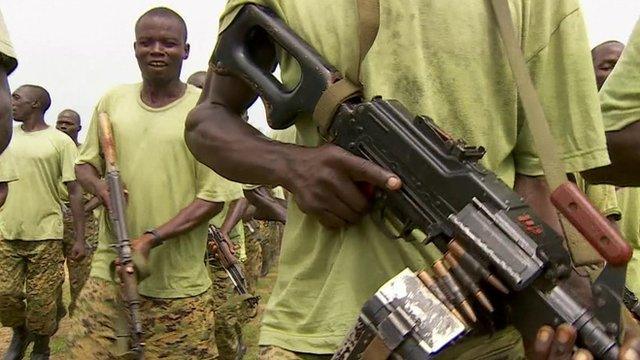South Sudan's shattered dream
- Published
Grass and leaves is all one family with six children has to eat in a village in Kaldak in South Sudan, as the BBC's Yalda Hakim reports
Almost four million people are facing severe food shortages, with thousands at risk of starvation, in South Sudan, in what has been described as one of the worst humanitarian crises.
According to a report published in October 2015, if immediate action is not taken, the country could face famine in a matter of weeks. Aid agencies are pleading with both government and opposition forces to respect the current ceasefire and give unrestricted access to the areas most in need.
The country's brutal civil war has forced two million people from their homes. Tens of thousands have been killed. The United Nations has accused the government and rebel fighters of atrocities and "crimes against humanity".
Survivors give detailed accounts of mass killings. Villages destroyed. Families wiped out. Women and children raped.
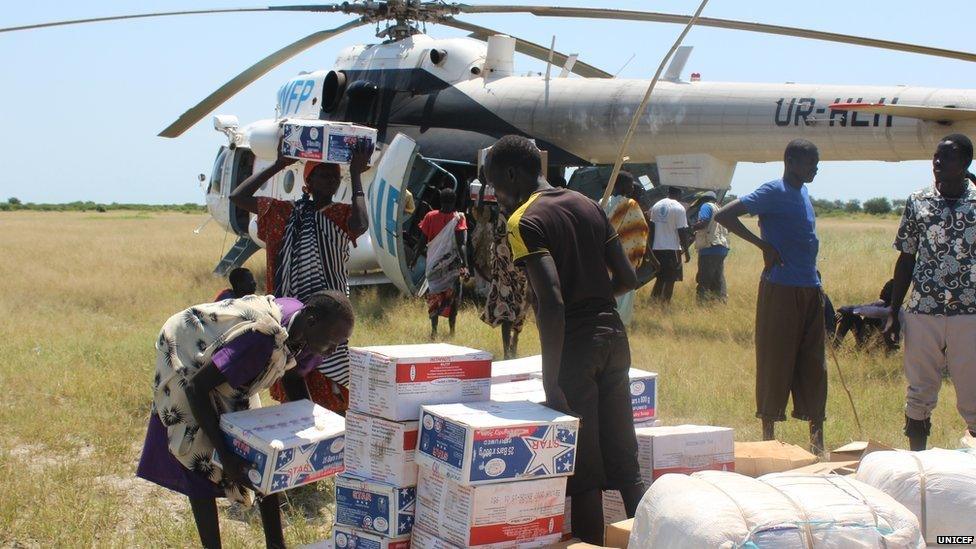
Women collect food supplies from a United Nations helicopter
The conflict was triggered by a political power struggle between the President, Salva Kiir, an ethnic Dinka, and his rival and former Vice-President, Riek Machar, a Nuer. But it quickly took on a bloody multi-ethnic dimension right across the country.
Entire villages have been cut off from the outside world. Aid agencies are, however, negotiating with the warring sides to allow them to enter. One of the worst-affected areas is Koch County in Unity State, in the north of the country. Here, 30 000 people face severe food insecurity and there are fears of a famine.

South Sudan: The world's youngest country
Split from Sudan in July 2011 after an independence referendum
One of Africa's least-developed economies. Highly oil-dependent
Relations with Sudan strained by disputes over oil revenue sharing and borders
A power struggle brought about civil war in December 2013
An estimated 2.2 million fled their homes during conflict
A tentative, internationally mediated, peace agreement signed in August 2015

For more than six months, the violence prevented international and local humanitarian teams from delivering much needed assistance. Now, Unicef and the World Food Programme have been given the green light to launch a relief and rescue operation. But with constant ceasefire breaches, fighting could erupt at any time, so aid workers can only stay a few days.
Knowing help has finally arrived, thousands of people who were hiding in the bush for months - surviving on water lilies - begin to emerge. Some people have walked for days. They're in desperate need of food, water, medicine and basic shelter.
At first glance, it appears to be chaotic. But there is some order here. It's mainly the women who queue for hours in the searing heat to collect their supplies.
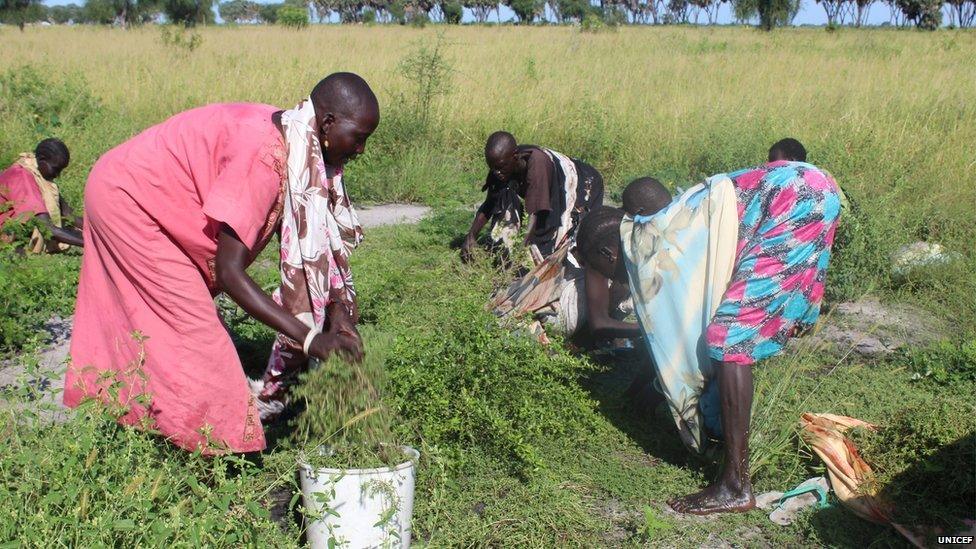
Women from Kaldak collect grass and leaves to eat
"Based on the analysis that we have just received, southern Unity has been identified as one area where potentially we could have famine," Joyce Luma, country director for the WFP, tells me. "What we don't know really is the extent to which there has been mortality. We are worried that those we are not able to reach are in a much worse situation."
The town of Kaldak in the north-east of South Sudan has been completely flattened, destroyed, following a major government offensive. After months of heavy fighting, the town is now in opposition hands.
Devastation
With thousands close to starvation, rebel fighters have agreed to give access to aid agencies. I'm with a team from Unicef who are going in for the first time in more than 12 months.
As we descend into the town by helicopter, it's a scene of devastation. Where once this was a thriving fishing community, now families are camped out under trees, homes have been destroyed. In stark contrast to the peaceful Nile flowing through, two large abandoned military vehicles dominate the village. The children now use them as an adventure playground.
It's evening time, and Regina is busily preparing dinner for her family. I look into the pot to see what it is she is cooking and am astounded and shocked to find she is just using grass and leaves to feed her six children. It's all she has.
"They eat it when they are hungry. When they eat it, they get sick, they vomit and they get diarrhoea. For about 30 minutes I feel strong and healthy, but after several hours I start shivering," she tells me. I see hundreds of people around her eating the same.
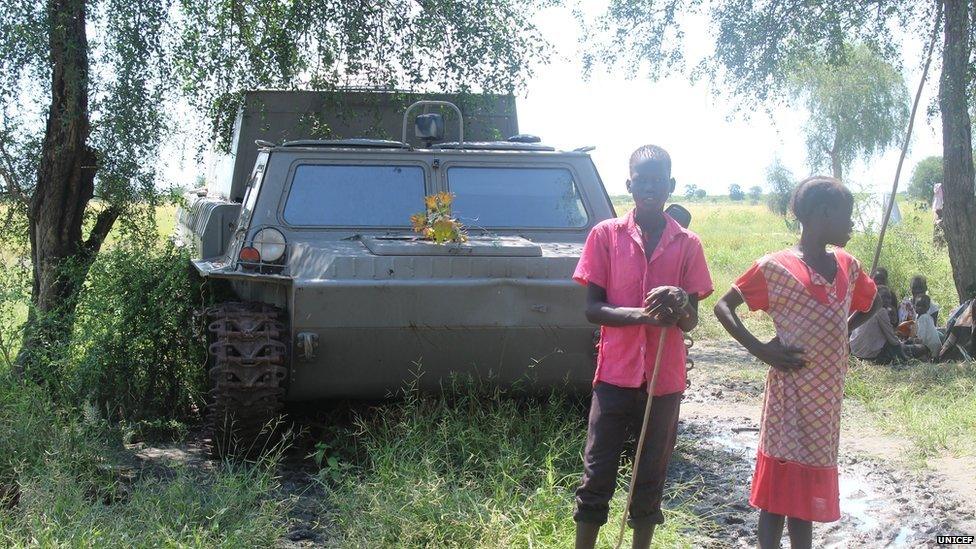
Children play by a remnant of South Sudan's civil war
Regina spends most of her day in the fields searching for the next meal. And she isn't alone. Other women from the village are doing the same. "I'm just doing this in order to survive, but when I eat these leaves I become even hungrier. We are like cows here," she says. Another woman says they would have died long ago if it were not for the grass.
There is very little or no nutritional value in this grass. I was told by a health-worker that these people could actually develop major problems with their liver and kidneys if they consume it over a long period of time. Some of these families have been eating grass and leaves for about six months.
Four and a half years ago, the world's youngest nation had promised so much hope for millions. But war has destroyed everything. Now, it is on the brink of famine.
South Sudan: Shattered Dream with Yalda Hakim is on Our World on the BBC News channel at 21:30 GMT on Saturday 31 October and Sunday 1 November and on BBC World News at 23:30 GMT on Friday 30 October and 11:30 and 22:30 GMT on Saturday 31 October and later on BBC iPlayer.
- Published18 April 2023
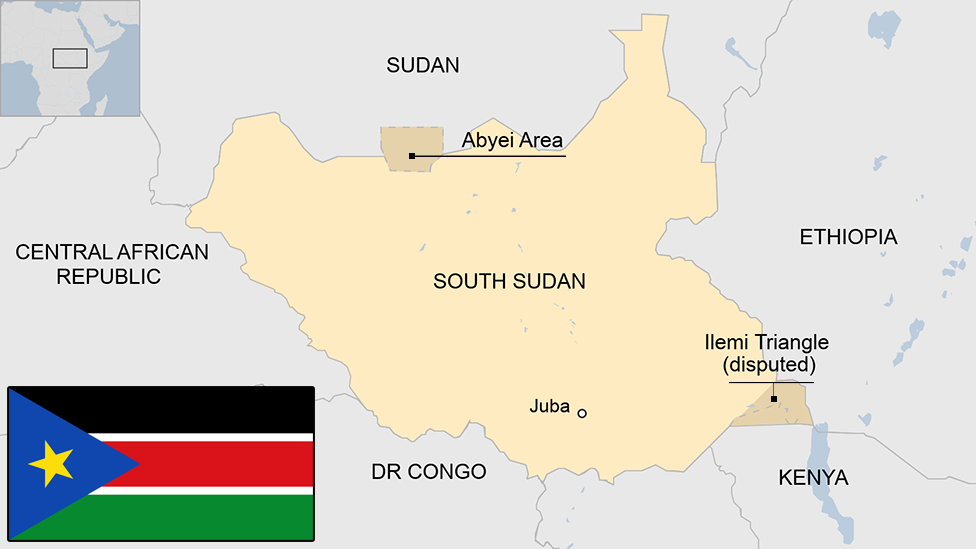
- Published22 October 2015
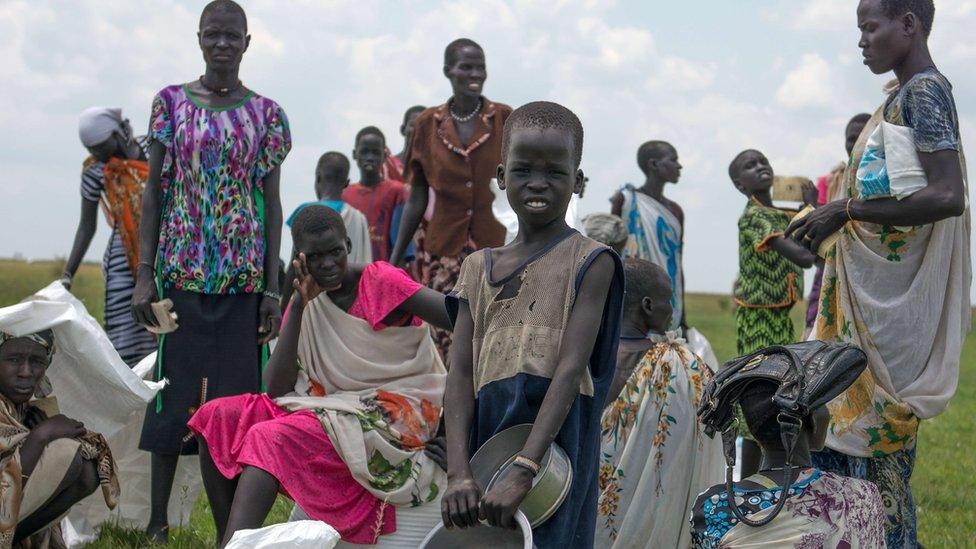
- Published12 October 2015
